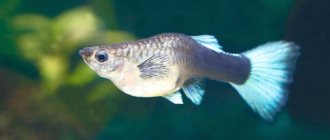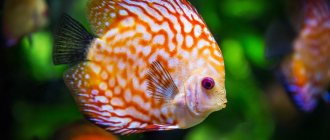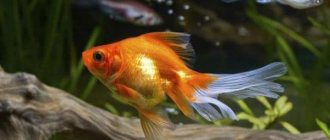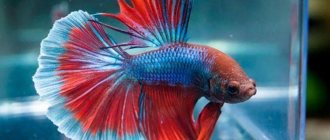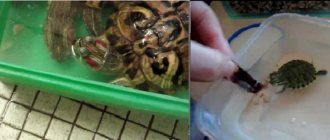Have you ever heard that representatives of the ichthyofauna remember events for no more than 3-10 seconds? These data have nothing to do with the observations of ichthyologists, or with reality in principle, otherwise fish simply could not exist and died out millions of years ago. Contrary to popular misconception, fish have memory, both short-term and long-term. Yes, they cannot be called highly intelligent creatures, but they perfectly remember everything necessary for survival.
Today we will talk about the mechanisms for capturing and analyzing information by representatives of ichthyofauna in the simplest possible terms, without using specific terminology. We will tell you about experiments carried out by both ichthyologists and ordinary aquarium hobbyists. Believe me, innate instincts play a huge role in the life of fish, but they are not the only ones that determine their behavior. Representatives of the ichthyofauna are much smarter and more memorable than is commonly thought!
Memory as a survival tool
First, let's talk about fish living in natural conditions. Their existence is determined by many random factors, so it will not be possible to fully rely on the instincts inherent in nature (by the way, which also arose as a result of memorizing and analyzing information).
This bait provides a rich catch even with a bad bite! More details
Natural conditions, food supplies, varieties of natural enemies - all this changes over time, and sometimes during the life of one generation. This means that, willy-nilly, fish have to imprint a lot of information in their memory, in particular about:
- the most food-rich areas of the reservoir;
- potentially dangerous places;
- attractive spawning areas;
- external appearance of natural enemies (and humans);
- natural environment (especially important for schooling fish) and other vital aspects.
As a result, we can conclude: a well-developed memory is a prerequisite for survival for representatives of all types of marine and freshwater ichthyofauna.
Some species are true intellectuals among their own kind. The same tropical cleaner wrasse is able to remember and recognize its own image in the mirror (by the way, only a few species of higher animals can do this). By the way, some species of wrasses have adapted to clear the spines and shells of sea urchins, using corals for these purposes. This means that one day one individual had an insight (that is, a kind of insight, such as Archimedes’ “Eureka!”), She thus got to the coveted food and imprinted the acquired information in her brain. Moreover, other individuals adopted and remembered the experience gained!
Some species (for example, butterfly fish) choose a mate for life and store the appearance of the partner in memory. In short, there are many examples!
Unbiased opinion of fishermen
The opinion of aquarists can be explained. Love for pets and other tenderness will definitely put the owner on the side of good. Fishermen who “contact” with free inhabitants of reservoirs have a completely different opinion.
Arguing about the memory of fish, fishermen have long been divided into two camps.
Some people believe that swimmers are unable to remember absolutely nothing. They argue this with “the same rake” that any crucian carp steps on when it gets off the hook. As soon as he manages to escape from his death, he immediately pecks on a nearby hook.
However, the herd feeling and competition have not been canceled. A lip damaged by tackle is not yet a reason for a hunger strike, the fish decides. And then he bites again.
Fishermen's opinions about fish memory are divided into two camps
Other fishermen, on the contrary, defend the right of finfish to thinking abilities. This group includes those who actively feed future prey near the shore. Most of these fishermen have a favorite place where they prefer to pilgrimage even on days off from fishing. By teaching the fish to eat in the same place, the angler ensures an excellent bite. After all, the fish will definitely come to a nutritious place.
So, systematizing knowledge about fish memory, we can highlight the following points:
- Pisces are capable of remembering. True, they only remember what is useful to them for survival. Place of feeding, appearance of dangerous brothers, tasty baits.
- Some instincts are sometimes stronger than a fish's memory. Trying to grab a larger piece, the carp ignores its own experience and gets hooked again.
- Most knowledge is related to food, but this does not mean that other factors disappear from the minds of fish.
Observations from fishermen and aquarists
Anglers can be divided into two camps. Representatives of the first believe that the situation with memory and “thinking” among representatives of the ichthyofauna is very deplorable. It was from them, apparently, that the legend about the three-second capture of information by fish came from.
As an example, it is customary to cite the same crucian carp, which, having safely gotten off one hook, is able to get caught on the next one in a matter of seconds. So, he did not forget about the trouble that happened to him, but simply considered that the tasty bait was worth a torn lip, and decided to repeat the experiment. And here is another example of competitors crowded around, claiming to have exquisite food! In a word, the memory of fish often succumbs to the pressure of instincts, especially during the period of gluttony.
Other fishermen, on the contrary, rely on the ability of representatives of the ichthyofauna to remember the information they need. At the beginning of the session, they carry out massive feeding of a certain water area, then continue to feed the fish in smaller portions. The fish remembers the location of the makeshift dining room and continues to return to the same place even after stopping feeding.
Aquarists sometimes endow their pets with truly fantastic qualities and almost human intelligence. They claim that the fish recognize them by sight, but are wary of strangers. It’s quite possible to believe this: if fish are able to recognize themselves in the mirror and remember the bright images of their own “beloved”, why shouldn’t they capture their owners as well? Moreover, this is part of the survival mechanism: a stranger is always a potential danger. Another thing is that aquarium fish do not particularly need to strain their brains: they live in satiety and safety, regardless of their own behavior and intellectual abilities.
What exactly makes sense to remember?
The memory of fish is significantly different from that of humans. It has selective properties, only what is of vital importance is remembered. River fish remember feeding places, resting places, school members, and natural enemies. There are two types of fish memory - long-term and short-term.
Aquarium fish also remember the information they need. Unlike their free brothers, they are also able to remember the identity of the owner and feeding time. Many experienced fish lovers notice that if they feed their pets by the hour, then during the approximate feeding period all the little ones gather in one area waiting for food.
They are also able to remember all the inhabitants of the aquarium. This allows them to detect newcomers who are added to the aquarium. Some fish study new residents with interest, while others shy away from strangers.
To reliably answer the question “do fish have memory?”, various experiments were conducted.
Examples of memory demonstrations by freshwater fish
If checking the memory of a dog or cat does not present any special problems, then with representatives of the ichthyofauna, especially those living in natural conditions, the situation is much more complicated. However, it is quite possible to identify some trends.
- Grass perch . These fish constantly patrol the reservoir in schools of same-aged individuals. They get lost in them even in the first summer of life and are constantly kept among their “classmates.” Each perch knows its comrades by sight and, having strayed from the pack, searches with all its might for its family.
- Catfish _ Each of the freshwater colossi has its own favorite hole, from which during the period of activity it does not stray far (it even hunts nearby). For the winter, catfish leave their summer apartments to return to them again in the spring. And note: even long hibernation does not have a detrimental effect on the memory of these giant fish!
- Burbot . Freshwater cod is extremely committed to its chosen habits once and for all. There are so-called “burbot trails”, that is, the routes followed by a predator in the process of searching for food. It never leaves their side, which is what experienced burbot fishers take advantage of: the main thing is to monitor the route of the freshwater cod, and then it’s a matter of technology: the burbot devours literally everything that’s considered edible that comes across along the route.
Many predators have their own hunting grounds, to which they return after long wintering and spawning. By the way, some species of freshwater fish (for example, carp) tend to spawn in a place chosen from the first spawning, changing their habits reluctantly, only under the pressure of circumstances (for example, with a serious change in water level).
Red guppies
This group can include all guppies that are red in color, but have a variable pattern - this is a solid red color, red blond guppy, red dragon guppy, red mosaic, red platinum, red-black, red Tuxedo, red Moscow, flamingo guppy, scarlet, red snakeskin, etc.
Red snake skin guppy
Red cobra guppy photo
Red dragon guppy photo
Super red guppy photo
Guppy red blond photo
Guppy flamingo photo
Experiments by ichthyologists
The observations of practicing fishermen are good, but they are clearly not enough to confirm the thesis about the presence of long-term memory in fish. Therefore, we present evidence of this fact obtained by ichthyologists in different parts of the world in the course of independent research:
- Japan . The object of experiments by neurobiologists was zebrafish. These fish have a transparent brain, which was tinted with fluorescent proteins, which made it possible to monitor the activity of individual areas. The fish were taught to leave a certain sector of the aquarium by a signal from a blue diode (turning on the light - a noticeable electric shock). At first the reaction was slow, then, literally a day later, the neurons of the forebrain were activated, and the fish learned to instantly “run away” from the electric shock. The reflex to the light signal persisted for weeks and months even when the “whip” in the form of an electric shock was removed. And when parts of the brain responsible for long-term memory were surgically removed from some individuals, they forgot about the experience literally within a day.
- Ireland . Local scientists gave electric shocks to goldfish that swam into a certain area of the aquarium. One or two impacts were enough for these fish to stop swimming into the danger zone for at least a day. Some representatives of the ichthyofauna stored information about their experience for several weeks.
- Australia . The object of research by Australian scientists was the sand croaker - a freshwater fish, a local champion in survival. Not only was she able to adapt to the most unfavorable conditions (many Australian rivers practically dry up during the hot season), but she also remembered and successfully used various hunting tactics for prey of various species. And this fish retained the memory of the meeting with the predator for several months, which resulted in a hasty escape from the site of the next rendezvous with the natural enemy. A young student from Adelaide also did a good job on this topic. He lowered special beacons into different places in the aquarium, and then poured food into the same areas. Every day the fish's reaction to the appearance of the mark accelerated. And when the student stopped using the beacons for a few days and then resumed, the fish gathered near the potential feeding point in a matter of minutes.
- Canada . Here we studied one of the subspecies of cichlids well known to aquarists. At first they were regularly fed for several days in one corner of the aquarium, then they were removed for a couple of weeks and returned to their place. The hungry cichlids immediately swam to the makeshift dining room and began to patiently wait for a portion of food!
- Israel . Once again, goldfish played the leading role: they were fed in the aquarium while listening to music. Then close relatives of the crucian carp were released into the reservoir and periodically they played the “tasty” music they knew. For almost six months, the fish swam to familiar sounds, without receiving food reinforcement. By the way, these golden-scaled representatives of the ichthyofauna are able to distinguish and remember melodies, that is, they have an ear for music and auditory memory!
Australian experience
Particularly noteworthy is the experiment conducted by one Australian student. He placed the beacon in the place where he threw food to his pets. Moreover, he placed it in different places so that the fish could remember exactly the mark and did this 13 seconds before distributing the food. This went on for three weeks. The first days it took the fish at least a minute to gather at the distribution point. By the end of the experiment, they completed this task in about five seconds.
The researcher then took a break of six days and distributed food without a beacon. After resuming the experiment, he was surprised to find that after lowering the beacon, the fish needed only 4 seconds to swim to the place.
This showed that fish have fully developed both long-term and short-term memory. That is, they remembered the event that happened a week ago, and they had enough patience to wait fifteen seconds before the food was distributed after the beacon was lowered.
Summary
During the research, it was found that fish have quite decent memory: they are able to remember events and images that are important to them for a fairly long period of time. And the more important this information is for a comfortable and safe existence, the faster it is absorbed by the brain and stored for a longer period.
So you shouldn’t consider fish dumber than they really are. Let us repeat: you cannot call them intellectuals of the animal world, but representatives of the ichthyofauna are able to remember what they need for months and even years!
Fishermen wonder why I’m biting and they’re not?
I’m revealing a secret just for you: it’s all about the miracle bait! More details
Why does a fish need memory?
The life of a free fish is dynamic and unpredictable. Today she is looking for food, and tomorrow she is fleeing from a hungry predator. Their aquarium counterparts lead a more passive lifestyle. It was they who became the heroes of the myth about the short memory of fish. But are their thinking abilities really that weak?
First, it's important to note that fish have virtually nothing to remember. For domestic gourami, food falls from the sky, and living conditions change extremely rarely.
Secondly, no matter how hard the fish tries to keep important facts about its life in its head, the owner will still not be able to find out about them. While the memory of a dog or cat can be easily tested, such experiments are difficult to conduct with a fish.
It is quite difficult to test the presence of memory in fish experimentally.
Guppy cobra
And finally, let’s highlight two more popular morphs of the common guppy, the qualification for which is the body pattern. Cobra guppies are all guppies with “snake skin”.
Guppy cobra blue photo
Guppy cobra green photo
Yellow cobra guppy photo
Red cobra guppy photo
Guppy Cobra Ceylon photo
Guppy green
Green cobra, green Moscow guppy, snake skin +++
Green Moscow guppy photo
Green snake skin guppy photo
Guppy green cobra photo
Guppies are black
This group includes black guppies under loud names such as: black monk, black prince, black tuxedo, black Moscow. The problem with this group is the difficulty of selectively retaining black tones. Therefore, good black specimens of guppies are highly valued by aquarists.
Guppy black monk photo
Black Moscow Guppy photo
Guppy black prince photo
Black Tuxedo Guppy photo
Guppy solid black photo
